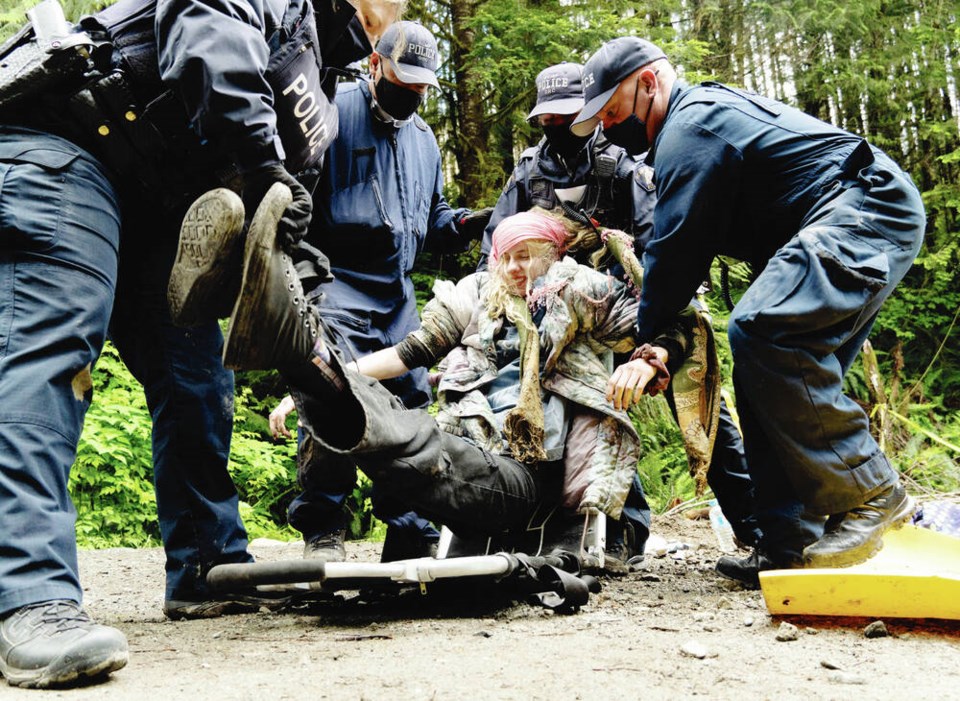Forestry company Teal Jones Group says it plans to appeal a B.C. Supreme Court decision that put an end to an injunction intended to prevent people from obstructing logging operations in the Fairy Creek area near Port Renfrew.
Justice Douglas Thompson denied the Surrey-based company’s application to extend the injunction in a decision issued Tuesday that cited the RCMP’s methods of enforcing the injunction as damaging to the court’s reputation. Thompson said the reputation of the court outweighed the economic interests of the company.
Teal Jones said in a statement Wednesday that it was disappointed by the decision and has notified legal teams for those opposed to the injunction that it will appeal.
“To do otherwise would be to allow anarchy to reign over civil society, and for misinformation campaigns to win over fact,” the company said.
The company said it plans to continue its work in Tree Farm Licence 46, and if it’s unable to do so, it may be forced to lay people off and shut down mills. Teal Jones said most of the logging in the area is of second-growth trees, but they do cut some old growth.
Thompson, in his ruling, acknowledged that blockades have caused “irreparable” and “significant” economic impact to Teal Jones, but said the injunction has only been somewhat effective in enabling the company to resume its operations.
Thompson’s decision said police actions to enforce the injunction have led to “serious and substantial infringement of civil liberties.”
In response, Brian Sauvé, president of the National Police Federation, which represents about 20,000 RCMP officers across Canada, said the union is proud of its members’ “professional, thoughtful and patient approach” to enforcing the injunction in the face of “aggressive physical, racial, and personal taunts and threats by some of the [protesters].”
Thompson said that police infringement of civil liberties has included impairment of the freedom of the press “to a marked degree.” Members of the media have been barred from entering the injunction area without a police escort.
The judge also criticized the RCMP for ordering officers to remove their name badges and for not enforcing a directive against wearing “thin blue line” patches.
While officers maintain the patch is worn to honour members who have died on duty, some see them as a symbol of the RCMP’s involvement in enforcing policies intended to bring about the “genocide of Indigenous peoples,” Thompson wrote.
“I am certain that RCMP commanders know that these ‘thin blue line’ patches are seen as provocative and insensitive by some of the citizens they serve,” the judge wrote.
In response, the police union doubled down on the thin blue line concept. “In many circumstances and on many occasions over the last 133 days, they have embodied the thin blue line between order and chaos,” Sauvé said in his statement.
Rob Gordon, a professor of criminology at Simon Fraser University, argues the union is inciting its members to defy their superiors by encouraging them to wear the thin blue line patches that are not approved by the RCMP. The union pushed back last fall and ordered patches for all its members when the RCMP issued a memo saying the patches are not to be worn on uniforms.
Gordon said he’s increasingly concerned about the implications of the union encouraging defiance in officers.
“It’s scary, because they have so much power,” said Gordon, who believes the RCMP needs to be disbanded in favour of a different policing model.
Thompson’s ruling will likely affect public confidence in the RCMP, said Gordon, who argues that Mounties are shifting away from their fundamental role of enforcing the law in a dispassionate manner.
“I think that they’ve lost a lot of face as a result of Mr. Justice Thompson’s judgment. But then they’ve lost face because of their whole approach to this issue in the first instance, which was one of aggressive and paramilitary leveraging. It doesn’t work,” he said.
Thompson also criticized protesters in his decision, saying they have escalated their tactics to the point where serious property damage has been done and there is a risk of serious injury. He cited the digging of eight-foot-deep trenches in public roads as an example of the “escalation in illegality.”
Police can still pursue criminal charges against those breaking laws, but do not have authority to create expansive exclusion zones and checkpoints blocking access to public roads, which have continued despite the judge ruling those practices were unlawful in an August decision.
An interim injunction expired Tuesday afternoon.



